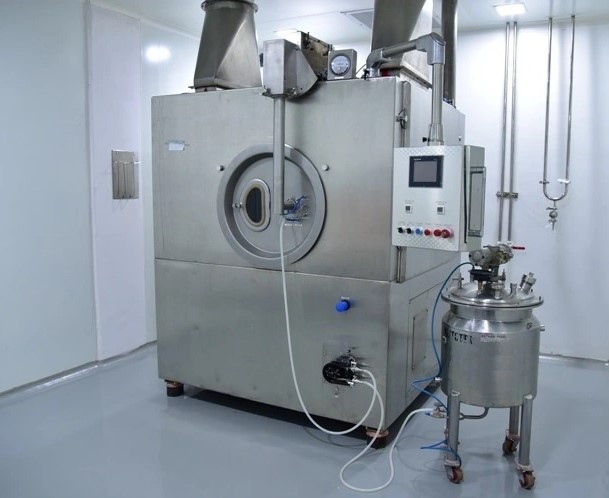Tablet Coaters in the Pharmaceutical Industry
Tablet coaters are machines used in the pharmaceutical industry to apply a coating layer to tablets. Coating is done for various reasons, including improving tablet appearance, taste masking, protecting the active ingredient from moisture or light, and facilitating swallowability. Here are some common types of tablet coaters:

-
Film Coating Systems:
Film coating is the most widely used method for tablet coating. It involves applying a thin film of coating material onto the tablet surface. Film coating systems can be categorized into the following types:
-
Pan Coaters:
These are traditional coating pans where tablets are rotated and sprayed with the coating solution. They can be either perforated pan coaters or non-perforated pan coaters.
-
Fluid Bed Coaters:
In fluid bed coaters, tablets are fluidized by a stream of air, and the coating material is sprayed onto the fluidized bed of tablets. The tablets are continuously agitated, allowing for efficient and uniform coating.
-
Sugar Coating Systems:
Sugar coating is an older and less commonly used method of tablet coating. It involves layering multiple coats of sugar-based solutions onto the tablet surface, followed by polishing. Sugar coating provides a thick, glossy coating but is time-consuming and requires a high level of expertise.
-
Enteric Coating Systems:
Enteric coating is used when tablets need to be protected from the acidic environment of the stomach and instead dissolve in the intestines. Enteric coatings are resistant to stomach acid but dissolve in the higher pH of the intestines. Enteric coating systems typically use specialized coating solutions and equipment to achieve the desired enteric coating properties.
-
Functional Coating Systems:
Functional coatings serve a specific purpose, such as providing a controlled-release profile, taste masking, or moisture protection. These coatings may require specialized equipment and coating solutions tailored to the specific functional requirements.
There are variations and advancements within each type of tablet coater, and different manufacturers may offer their own proprietary designs and technologies.
When selecting a tablet coater, factors to consider include the desired coating quality, production capacity, coating time, ease of cleaning, and compliance with regulatory requirements. The specific type of tablet coater chosen will depend on the specific coating requirements of the tablets being produced and the capabilities and preferences of the pharmaceutical manufacturer.